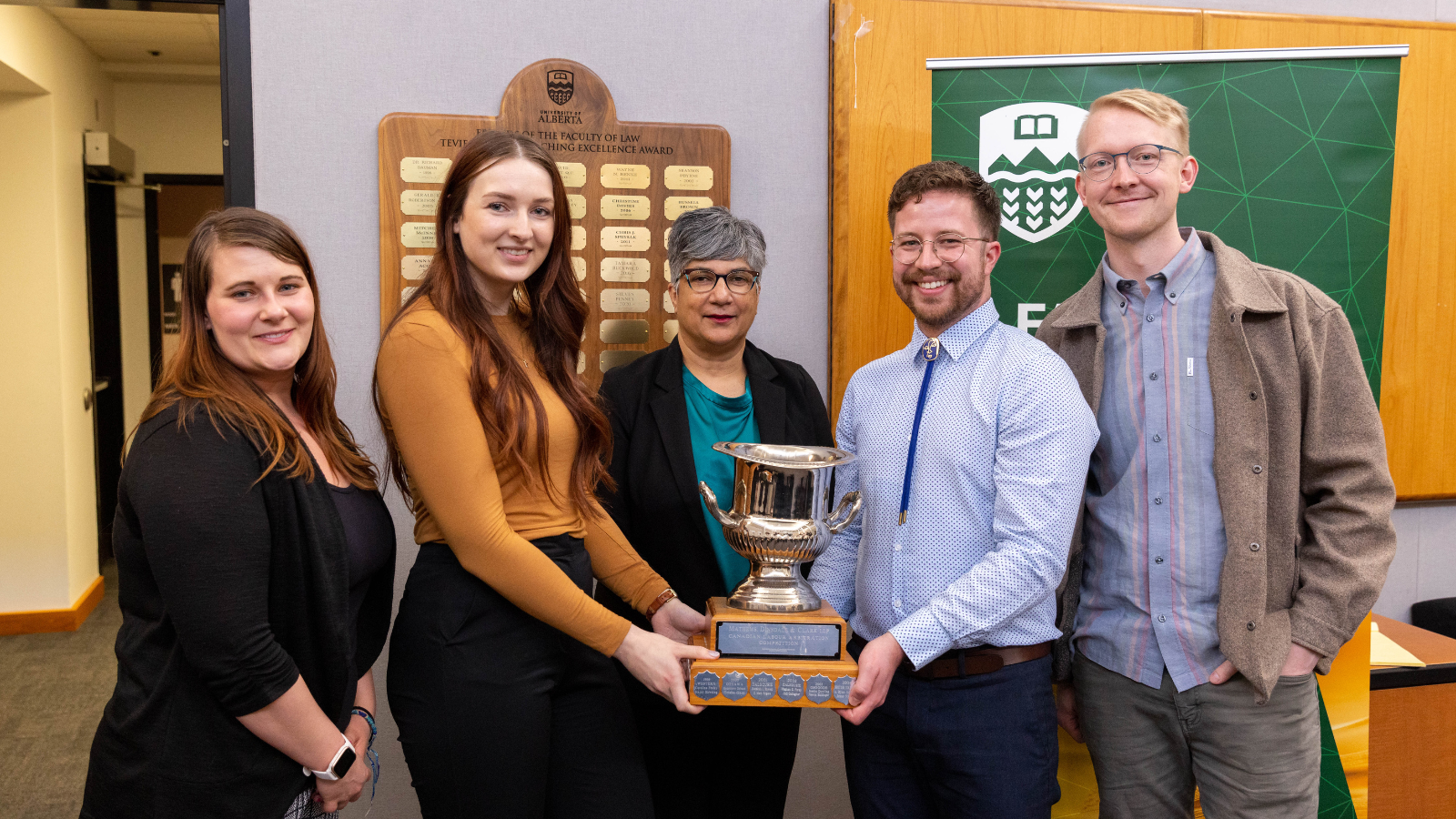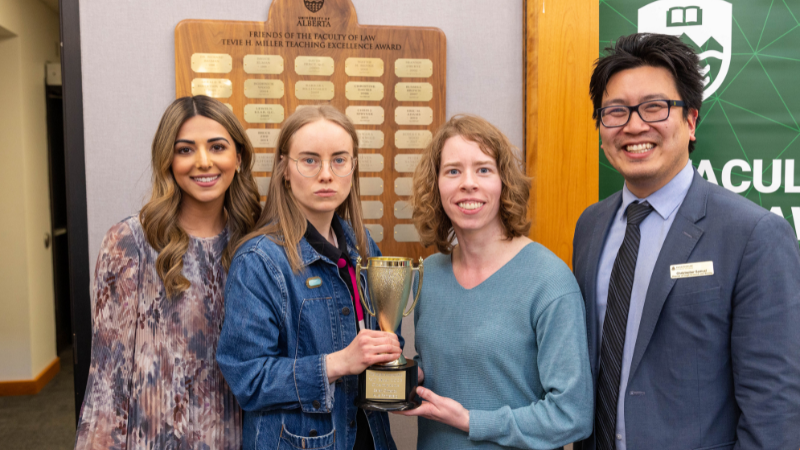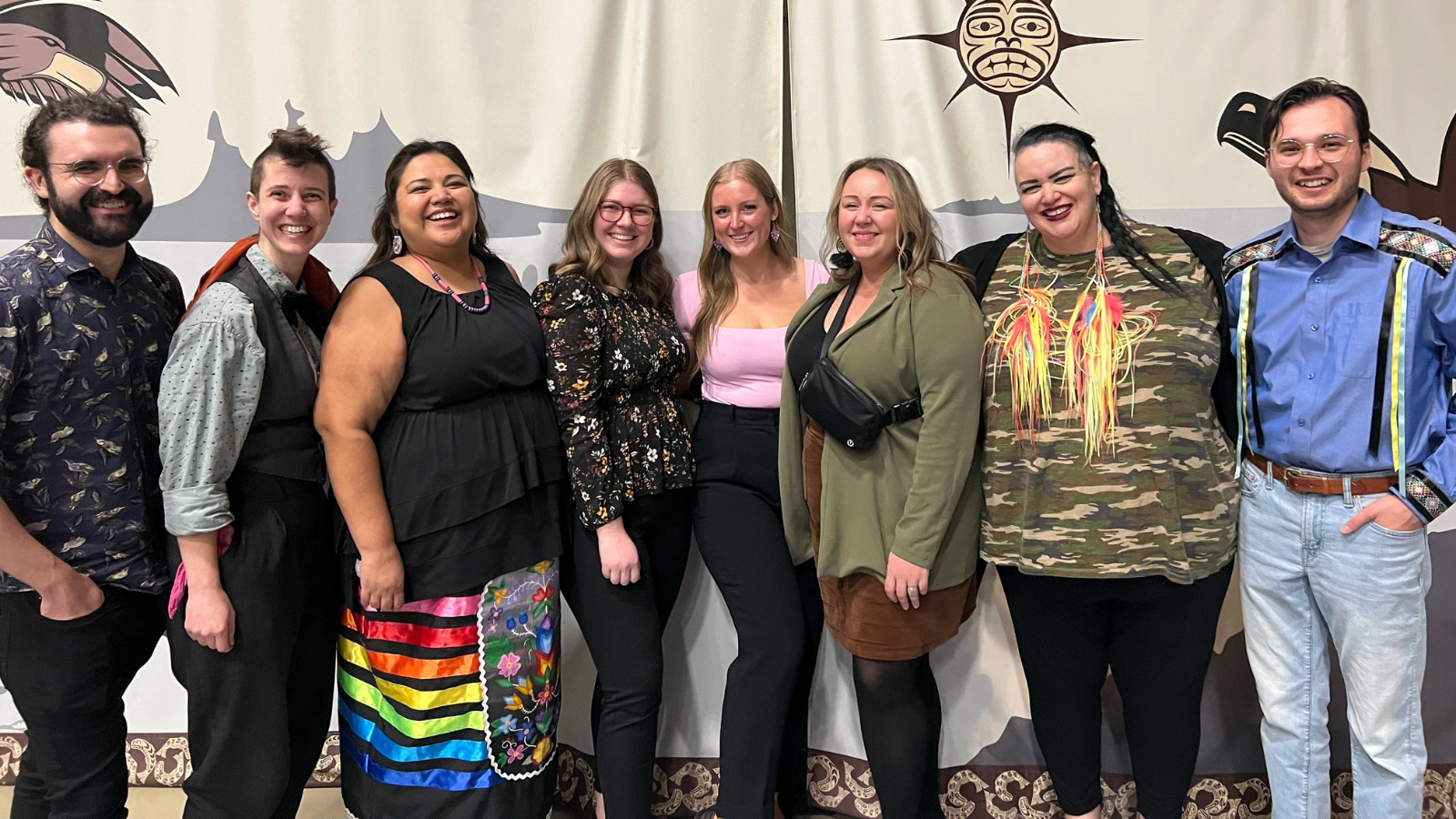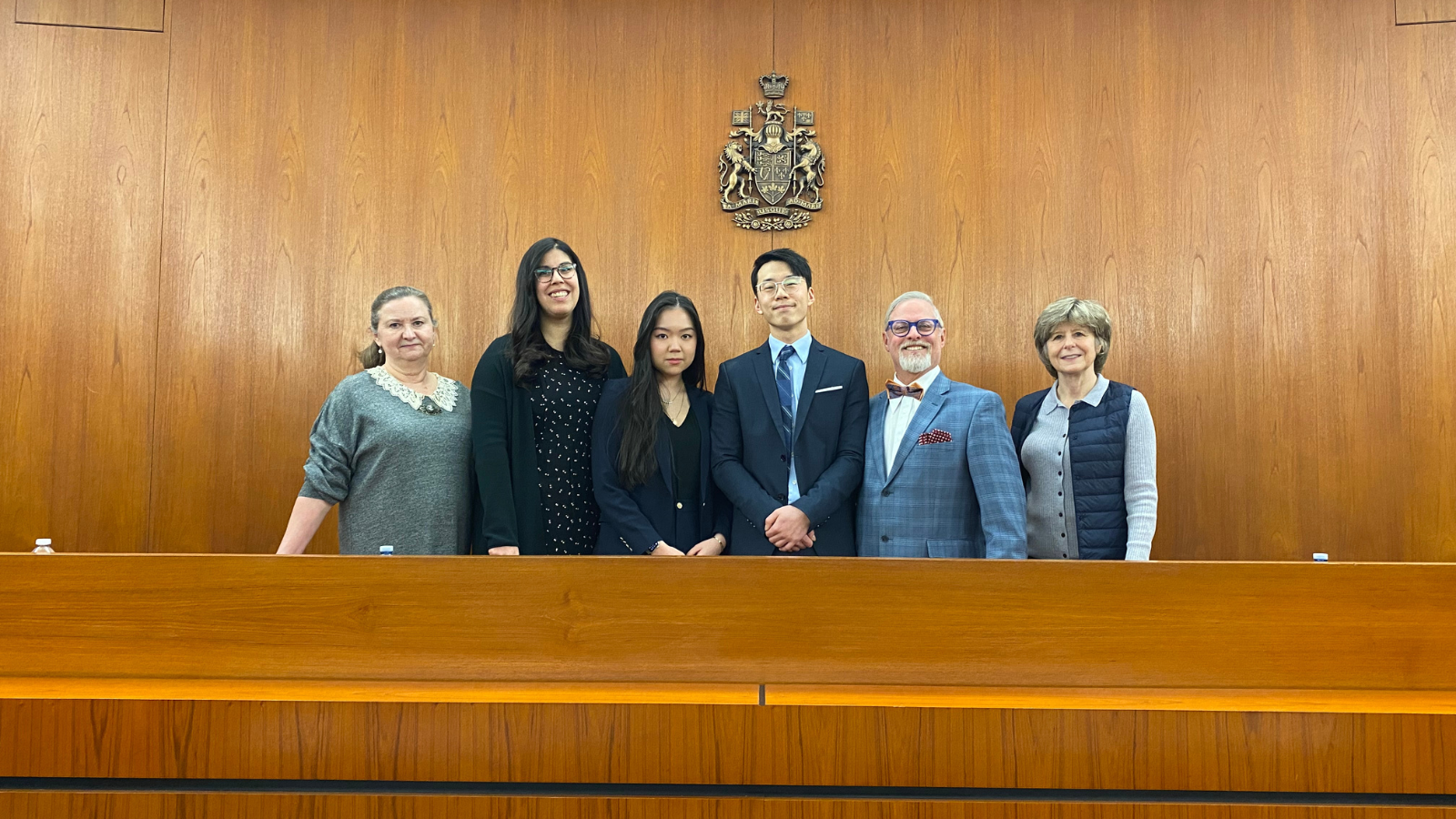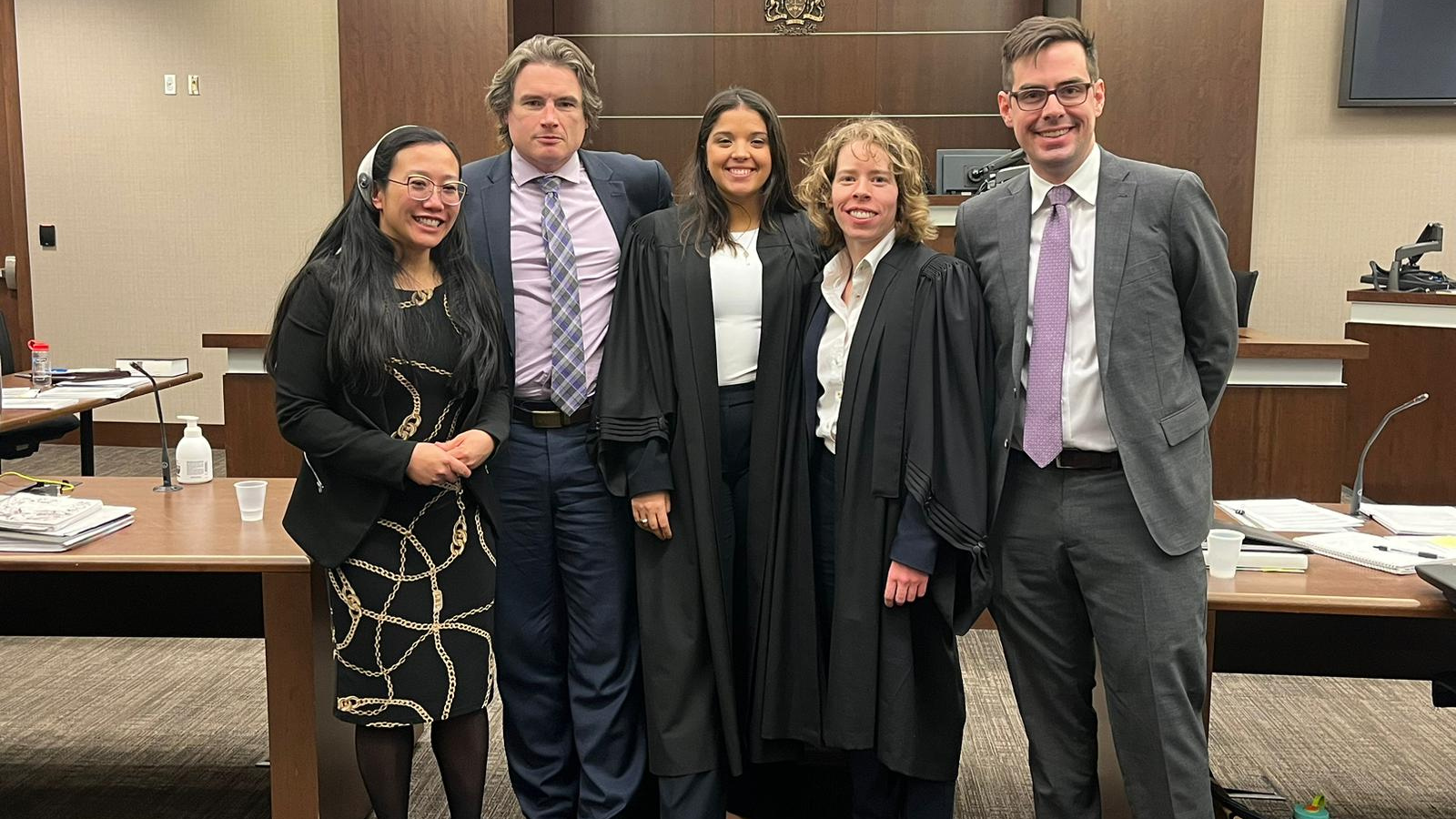Competitive Moot Program
Moot Court Competitions are a tradition among Canadian law schools. They present students with the opportunity to hone their advocacy in an environment that closely replicates a real-life court room.
Participation in a competitive moot is a major opportunity to develop your skills, confidence and knowledge. Mooting offers one-on-one intensive coaching and evaluation by peers, faculty, senior lawyers and the judiciary. Final rounds of the national competitions are often judged by Supreme Court of Canada justices. The work is tough but extremely satisfying. The competitive aspect brings out the best in participants and is a powerful networking opportunity — especially for students interested in specific practice areas. It is also a means to demonstrate the excellence of our students and our law school. Our moot success is a significant source of prestige for the University of Alberta.
The majority of competitions take the form of a traditional appellate case. Subject matter ranges from securities law to health law to constitutional and human rights law. In addition to the traditional appellate formats, there are other competitions that teach skills in areas like client counselling, criminal trial advocacy, consensus-building, and dispute-resolution.
Participation in a competitive moot is worth three academic credits. The program is open to second- and third-year law students. Students must apply to join a team. Participants are selected based on interest, qualification and available space. For most moots, competition in the Brimacombe Moot is a prerequisite. Ensure you review the Moot Manual before completing your Competitive Moots Application Form to see which selection process applies..
Attend the Moot Information Session in the fall, or speak to the coach specific to the moot.
You may apply to several teams, but are chosen only for one.
The application deadline for the Competitive Moot Program is shortly following the information session. Check the application form for submission details.
Registration for Law 598: Moot Court Competition occurs after selection.
Students who have mooted in the previous year are encouraged to apply again for a new moot. Except in exceptional circumstances, students cannot participate in the same moot twice. The Vice-Dean makes the final decision of whether a student can participate in the same moot twice. Permission must be given in advance of the selection process.
The Brimacombe Selection Round is held every September. The competition is open to 2L and 3L students applying to join a competitive moot team.
You can find the problem and sample factums for the Selection Round in the "Materials for the Brimacombe" sidebar.
Teams for the following moots are selected through the Brimacombe:
- Alberta Court of Appeal (2Ls only)
- Bennett Jones Health Law
- Canadian Competition Law Moot
- Davies Corporate/Securities Moot
- Clinton J. Ford (3Ls only)
- Donald G. H. Bowman Tax Moot
- Harold Fox IP Moot
- Gale Cup
- Laskin Moot
- Michel Bastarache French Language Moot
- Philip C Jessup International Law Moot
- Wilson Moot
The winner and runner-up of the Brimacombe Moot are immortalized on the U of A Brimacombe trophy.
The competition is supervised by Brimacombe judges: Professors Erin Nelson, Adebayo Majekolagbe and Chris Samuel, who set the question and act as final authority respecting all questions relating to the conduct of the competition.
-
Application forms are available for download in the "How to Apply" tab. Completed applications may be emailed to moots@ualberta.ca.
-
Participants will be informed of the exact time scheduled for their moot presentation.
-
Each participant will present six minutes of oral argument. This includes time spent responding to questions from the judges. Additional written submissions are not accepted.
-
Participants shall work individually and are responsible for developing their own oral argument.
-
The Round will be held in the Eldon D. Foote Moot Court Room at the Faculty of Law.
-
Participants shall arrive at least 10 minutes before their scheduled presentation time. Because of the large number of students and very tight timelines, failure to be present when called upon will result in the participant's removal from consideration for the competitive moot program.
-
Participants will be gowned during their presentation (robes will be provided).
-
Participants shall not observe any other presentation until their presentation is complete.
-
On the day of the competition, participants waiting their turn will wait outside the Moot Court Room until summoned to appear.
-
There is no course credit for participation in the Brimacombe.
2019
Leah Strand, First, Team
Dylan Hanwell, First, Team
Nate Gartke, First, Team
Leah Strand, Best Mooter of the Final Round
The Adam F Fanaki Competition Law Mootis organized by the Competition Bureau, the Competition Tribunal and the Canadian Bar Association. The area of Competition Law is concerned with matters such as business mergers; abuse of dominant position; agreements between competitors; refusal to comply; price maintenance; other restrictive trade practices; deceptive marketing practices; specialization agreements; delivered pricing; foreign judgments, law and directives that adversely affect economic activity in Canada; and refusals to supply by foreign suppliers.
This annual event gives Canadian law students the chance to tackle timely, complex civil or criminal issues in a growing field of law that strives to balance private economic incentives with the public interest. Participants have the opportunity to obtain feedback from top law enforcers, judges, and specialist practitioners in an intimate setting. This event is also a great networking opportunity for anyone interested by a career in law.
2022 Team
Coached by Barry Zalmanowitz: Olivia Pietras, Kyle Ramsey, Nicholas Siennicki and Jacky Xu
This competition consists of three moots: criminal, constitutional and civil law (contract, property, or tort). Three teams of two mooters are selected. The roles of appellant or respondent are assigned by the competition organizers. The moot is only open to second year students.
The location of the competition alternates between Calgary and Edmonton. Aside from bragging rights, the school winning two of the three moots takes custody of the Challenge Cup Trophy.
The Alberta Challenge Cup was first held in 1984 and was renamed the Alberta Court of Appeal Moot in 1997.
2023 Team
Civil
Coached by Kyle Kawanami: Isaac Belland and Megan Reti
Constitutional
Coached by Don Padget and Andrew Foster:Allie Quigley and Michael Bradley
Criminal
Coached by Heather Gagnier and Dakota Vassberg: Marlee Chrystian and Hal Smith
The Bennett Jones Health Law Moot, generously sponsored by Bennett Jones LLP, is a competition between the University of Alberta and the University of Calgary. The moot alternates between Edmonton and Calgary.
The moot problem is drawn from an area of health law including, but not restricted to, medical malpractice law.
While there are no prerequisites for the moot, students are encouraged to have taken or be registered in Health Care Ethics & the Law, Law and Medicine, or Biotechnology Policy courses.
2023 Team
Coached by Beth Jonah and Tayler Meagher: Alysha Bailey, Blake Miller, Jaedan Bateman and Tina Pashootan
The Canadian Client Consultation Competition develops interviewing and counselling skills. It is an ideal vehicle for students enrolled in Law 546: Interviewing and Counselling but is open to all students in second and third year.
The team is selected by in house competition. In teams of two, competitors conduct a simulated thirty-minute client interview. A panel of judges assesses the teams and selects the best interviewing team using a detailed set of criteria. The winners' names will be inscribed on a shield donated by the Edmonton law firm of Reynolds, Mirth, Richards & Farmer LLP.
The winners of the in-house competition will go on to represent the U of A at the Canadian National Competition. The winners of the national competition advance to the Louis M. Brown and Forrest S. Mosten International Client Consultation Competition.
Students should note that participation can entail a significant time commitment. Since the Client Consultation Competition does not involve writing a factum, preparing for the competition will not involve extensive legal research. Grades will be based on the performance in the National Competition, a memorandum of law based on one of the interviews, and a reporting letter to the client. The written component counts for 50% of the final grade. Students will be graded as a team.
The Client Consultation Competition began in California in 1969. The University of Alberta first entered the competition in 1985, winning the Regional Competition in Idaho and placing second in the Nationals at Pepperdine University in Malibu, California. In 1990, the U of A won the International Competition. In 1993, the U of A won the Regional Competition and represented Canada at the International Competition in Glasgow, Scotland. In 2011, the U of A won the newly inaugurated Canadian National Competition and then went on to compete internationally in Dublin, Ireland.
2023 Team
Coached by Danielle Mousseau, Barb Acton and Farrel Shadlyn: Lauren Styles, Jay Koller, Cassidy Jiang and Kris Jun
The Clinton J. Ford Moot Court Competition was instituted in 1960. Clinton J. Ford was the Chief Justice of Alberta from 1957-1961.
The Clinton J. Ford Moot is held in the Eldon D. Foote Moot Court Room at the Faculty of Law. It is usually held in mid/late February, with the preparation of the factums beginning in the first term.
There are usually three judges: two from the judiciary, and one from Alberta Justice.
This “in house” moot is often used as a showcase for first year students who are preparing for their 1L moot experience.
The winning team’s names are inscribed on the Clinton J. Ford Shield. Each winning team member will receive a barrister's gown and vest donated by Alberta Justice. The runners-up each receive a $100 book prize donated by the Friends of Faculty.
2023 Team
Coached by Stella Varvis: Bridget Inocencio, Kate Jackson, Danielle Schmidt, and Supreet Singh
The Davies Canadian Corporate/Securities Law Moot is an annual competition focusing on corporate and securities law in Canada.
In addition to gaining in-depth knowledge and honing skills, this competition is an opportunity to meet with specialist counsel, regulators and academics, as well as judges (including the Ontario Court of Appeal and, occasionally, the Supreme Court of Canada). Students will engage in debate on legal issues of current importance to the Canadian business community.
The moot problem is typically in the form of two fictional judgments: one from the trial level and the second from the appeal level. These are usually based on actual recent corporate law cases. Issues are pre-determined. The moot is an appeal heard by a mock “Supreme Court of Canada.” The problem is delivered to participating teams in early January; as a result, all of the work for this Moot is concentrated in the Winter term.
The Moot requires teams to prepare two factums – one for the appellant and the other for the respondent. Both factums are due simultaneously in mid-February. For oral argument, each side will moot once as appellants and once as respondents. This “switcheroo” is one of the unique features of this moot.
In addition to independent research and writing to prepare the factums, members of the moot team will be required to participate in a number of factums review and drafting sessions with the advisor in January and early February. Team members will also be expected to prepare for and participate in a series of practice rounds before panels of volunteer judges in February and early March. This may include at least part of the February Reading Week.
The U of A gratefully acknowledges Stikeman Elliott LLP for its financial support of the Corporate/Securities team.
2023 Team
Coached by John Lemieux and Danny Wakeling: Ben Kriwokon, Erwin Kwok, Mark Stevens, Rohan Gupta and Shannon MacNamara
The Bowman moot addresses current issues in taxation law and policy and is well attended by law schools across the country. It is also very well supported by the Ontario tax bar and the Tax Court of Canada and Federal Court of Appeal. It is named after Donald G. Bowman, the former Chief Justice of the Tax Court of Canada and one of the eminent jurists students are likely to meet at the competition.
We are very grateful to the Edmonton tax community, which supports the team by serving as judges for the practice rounds.
To date, the organizers have selected an actual court decision as the moot problem that is typically released in early November. While the team will usually meet a couple times after the case is released to discuss it and possible avenues of research, the vast majority of the team’s work occurs after Christmas and up to the actual moot in Toronto. The team is responsible for preparing both an Appellant (typically due at the end of January) and a Respondent factum (typically due two weeks after the Appellant’s factum is due). Once the factums have been completed and submitted, the rest of the time before the competition is spent refining the team’s oral advocacy skills through practice rounds.
Like virtually all of the other upper year competitive moots, students should be prepared to devote a significant amount of time in January and February (including Reading Week) to this moot.
Given the subject matter of the moot, students interested in participating should at least be registered in Taxation in the fall term, or otherwise have some knowledge or experience in tax law. Students who have taken Taxation and other advanced taxation courses either in the Faculty of Law or other Faculties and students who have any other background in tax will be preferred. That said, students without a taxation background should still try out if interested.
2023 Team
Coached by James Yaskowich: Tyler Warchola, Judy Liang, Stephen Reith, Harry Cho
One of Canada's oldest and most prestigious moots, the Gale Cup competition is open to every law faculty in Canada, both English and French-speaking. Translation is provided for the factums in this bilingual moot and for oral argument on the day of the moot. The judges are drawn from Ontario courts and may include judges from other provinces, the Federal Court of Canada, and the Supreme Court of Canada. The majority of Canadian law schools compete in the Gale Cup. The final round judges typically include one or two Justices of the Supreme Court of Canada.
Each of the Alberta teams (appellants and respondents) moots once against another Canadian law school. If the Alberta team reaches the top four in the preliminary round, two of the team members will be chosen to participate in the final round, which determines the top four places in the competition.
Preparation for the moot is intensive. Team members must be prepared to direct a substantial amount of time towards this competition, beginning after selection in the fall. Extensive legal research and writing in the preparation of the factum is required. The appellants normally submit their factum in mid-January, meaning that a good deal of research and writing will need to be done beforehand. Respondents have two weeks to write their factum, which must be submitted in late January.
The team will participate in at least six practice rounds, scheduled in late January and early February, before panels consisting of Faculty, practitioners and judges of the Alberta Courts. Participants may be asked to limit their involvement in other activities, such as Law Show.
The problem is usually drawn from a Supreme Court of Canada decision. This year’s problem is grounded in criminal procedure and the exclusion of evidence. Credit or enrolment in Law 520: Criminal Procedure, is highly recommended but not required.
The U of A gratefully acknowledges Brian Beresh, QC, for his continued financial support of the Gale Cup team.
2023 Team
Coached by Kerri Facchinutti and Katherine Fraser: Azan Esmail, Brandon Blenkarn, Colleen Copley and Emma Stirling
The Harold G. Fox Moot is intended to promote the furtherance of education in the intellectual property field and to provide participants with the opportunity to interact with jurists of the Supreme, Ontario, and Federal Courts and experienced practitioners of intellectual property law. It is named in honour of the late Harold G. Fox, one of Canada’s leading intellectual property scholars and advocates.
The Fox Moot is sponsored by Dimock Stratton LLP and administered by a committee of judges and practitioners. The Moot is accompanied by a lecture by a leading thinker in intellectual property law.
2023 Team
Coached by Jenna Handford: Christina Basler, George Gagnon, Jessica Marple and Tina Tai
2022 Team
Coached by Anna Priemaza: Thomas Feth, Breanna Frape, Elias Jimenez Gonzalez and Kyla Ronneberg
Named for a distinguished US jurist, diplomat and scholar, the Philip C. Jessup International Law Moot Court Competition is a prestigious, international competition created in 1959 by the International Law Students Association. It is the world’s largest moot competition, typically involving more than 1500 students from more than 300 law schools in 50 nations on six continents.
At the first stage of the moot, the University of Alberta sends a team to the White & Case Canadian National Division Qualifying Tournament, usually held in February or March. The top two teams from this tournament go on to represent Canada at the International Rounds, held in late March/early April in Washington, DC.
The Jessup Moot problem is typically based on a hypothetical dispute between two fictitious states, and is argued, both orally and in writing, on the basis of public international law as if before the International Court of Justice. The problem is released in September and work begins immediately after selection.
Law 506: Public International Law (PIL) is a prerequisite or co-requisite for the Jessup Moot. Due to the necessary time required fully to participate in the Jessup Moot, a strong academic background will also be considered. It is also highly recommended that students have strong research and writing skills prior to becoming involved with the Jessup Moot.
An international law moot competition differs in many ways from domestic law competition. The sources of law are different, as is the terminology and the format of the written argument — the memorial — that is submitted to the Court. The memorial is typically longer and more detailed, both in argument and in legal citation, than a traditional domestic factum.
2023 Team
Coached by Péter Szigeti: Luke Van Bostelen, Olive Bensler, Ama Aidoo, Nicholas Siennicki and Suzanne Ross
2023 Team
Coached by Alex Bernard: Gaya Peringod, Jose Caraballo Marrero, Rebecca Alexander and Shaeel Meenai
The Kawaskimhon National Aboriginal Moot was first held in 1993 in Toronto. Since 1995, participating law schools across Canada have hosted.
The subject matter of the moot is a legal issue affecting Indigenous peoples.
The moot may or may not involve traditional appellate mooting. However, the moot usually involves a written proposal or argument, presentation of an oral argument, and consensus building. The moot may involve drawing from indigenous traditions to resolve the legal issues that arise from the selected topic. The moot format and process is decided by the host school. The written assignments for the teams may include a detailed written proposal containing issue identification, a summary of law, arguments, and negotiation strategies. In addition to legal research, students will prepare oral submissions, and write a short reflective and critical essay about some aspect of the moot (i.e. the issue, process, experience, etc.).
Students will meet regularly to develop a work plan, assign research and writing tasks, complete the proposal, and prepare for the moot.
Credit or enrolment in Law 590: Indigenous Peoples and the Law, although not a formal prerequisite, is an advantage for this moot.
2023 Team
Coached by Tamara Pearl and Koren Lightning: Emily Szeryk, Siobhand Washburn, Gavin Cazon-Wilkes and Michael McInnis
The Laskin Memorial Moot is a national bilingual moot and draws competitors from most of Canada’s law schools. The competition memorializes of one of Canada's greatest legal scholars and jurists, the late Chief Justice Bora Laskin.
Proficiency in French is a strong factor in team selection. To be clear, it is not necessary for all the team members to be bilingual. The rules require that at least one member of the team must present oral argument in French. The portions of the factum that will be mooted in French must be submitted in French. Simultaneous translation facilities are provided for those mooters who require it. For all participants, this is an excellent opportunity to experience advocacy in both official languages.
Prizes are given to the top pairings, teams, facta and oralists.
Credit or enrolment in Law 450: Administrative Law is highly recommended for this moot.
2023 Team
Coached by Jon Martin and Rob Drummond: Marcie Gray, Lianne de Kappelle, Skyler Johnson and Stephen Raitz
This is the only trial moot that involves the examination of live witnesses.
Selection for the MacIntyre Cup (Western Canada Trial Moot) is done through an in-house competition in which 2 winners are awarded the Coughlin Cup. This team of two students represents U of A at the MacIntyre Cup, in which eight teams from Western Canadian law schools participate.
The top two teams in the Western Canada Moot advance to the Sopinka Cup Trial Moot, in Ottawa. It is generally scheduled in early March. The Sopinka Cup includes a reception at the Supreme Court of Canada and a final banquet.
In past years, students have indicated that the amount of work required compares very favourably with the amount of work required for the appellate moots.
2023 Team
Coached by Don MacCannell, Steve Smith, Scarlett Chan and Bonnie Parker: Kyla Ronneberg and Jakarta Mackie
First held in the spring of 2023, the Morrison LLP Family Law Moot is funded by the Edmonton-based law firm of Morrison LLP, which was founded by a group of recent Faculty of Law alumni. The moot gives students the opportunity to gain more exposure to family law.
The moot is open to students from both the U of A and the University of Calgary. The moot allows students to develop skills in contentious litigation and advocacy and gain more exposure to concrete family law issues and topics, which will help them understand how interconnected family law files are with other areas of law. Participation in the moot also provides a way for students to showcase a distinct interest in family law on their resumes.
2023 Team
Coached by Erin Morrison and Nicholas Kuznyick: Becky Thera and Paige Gratton
2023 Team
Coached by Riley Gallant: Derek Zhenxinyu Zhang, Casey Caines, Kirsten Samson and Kate Latos
Le Concours de plaidoirie Michel-Bastarache est un concours annuel de plaidoirie en droit en langue française qui a lieu à Ottawa au mois de mars. Le concours est nommé en l’honneur de l’un des plus grands juristes et champions des droits linguistiques, Michel-Bastarache, ancien juge à la Cour suprême du Canada.
Le Concours de plaidoirie Michel-Bastarache vise à fournir aux participantes et participants une occasion unique de se rencontrer et de débattre des problèmes d’actualité touchant aux droits linguistiques. Cela leur permet ainsi d’acquérir une compréhension plus profonde et plus pointue des droits linguistiques et de l’art de la plaidoirie en français. Les objectifs du concours sont de contribuer à l’avancement des connaissances juridiques en droits linguistiques, d’encourager la formation en français d’étudiantes et étudiants qui suivent des cours de common law à l’échelle nationale, de leur permettre d’acquérir les connaissances et les techniques fondamentales de la plaidoirie, ainsi que de valoriser l’art de plaider en français.
Un des défis importants pour les avocates et avocats francophones et francophiles qui exercent la common law en français est de maintenir un niveau élevé pour s’exprimer, tant par l’écrit, notamment sur le plan du vocabulaire juridique, qu’oralement. Un concours de procès simulé, rassemblant les étudiantes et étudiants du programme de Certification de common law en français (CCLF) 1 , du Programme de common law en français (PCLF) et du Programme de droit canadien (PDC) de l’Université d’Ottawa, de la Faculté de droit de l’Université de Moncton et de la Faculté de droit de l’Université du Manitoba leur offre l’occasion d’acquérir des aptitudes supérieures en plaidoirie en français, tout en bonifiant leur formation sur les droits linguistiques.
Le Concours de plaidoirie Michel-Bastarache a lieu à Ottawa, normalement dans le cadre de la conférence annuelle Michel-Bastarache. Ceci donne aux participantes et participants la chance de vivre une expérience unique au cœur de la communauté juridique dynamique d’Ottawa, d’échanger et de faire du réseautage avec divers intervenants et avec des collègues d’autres universités qui offrent le programme de J.D de common law en français.
2023 Team
Coached by Morgan McClelland and Justine Fallu: Vivien Stefanic, Alexander Akiki, Kaitlyn Viteychuk and William Su
We are grateful to Chivers Carpenter Lawyers LLP, which provides the coaching and financial support for our U of A team, for its continued commitment to our students.
The National Competition is sponsored by Mathews, Dinsdale & Clark LLP:
Every January, teams from law schools across Canada join us for a weekend to compete in a simulation of a grievance arbitration hearing before tri-partite panels. Truly a national event, competitors include teams from British Columbia, Nova Scotia and everywhere in between. The oralists, coaches, panellists and other invitees from the labour law community join us at our offices for an opening reception on Friday night. The competition then officially begins Saturday morning at the Ontario Labour Relations Board. Each team presents once as union counsel, and once as management counsel.
The team is selected in the latter part of the Fall term, and teams are expected to do a significant amount of research and preparation following first-term exams and over the holiday period. Early in January, the team starts doing mock preparation rounds, initially with the coaches and then with three different panels comprised of local experts in labour law, including arbitrators and union and management counsel. The teams then compete in Toronto at the end of January and are evaluated on the basis of their oral advocacy, grasp of the legal issues, and facility with the breadth of relevant jurisprudence. Finalists advance to a second day of competition.
Success in the moot requires an intense commitment over December and January. This moot is unique in its emphasis on the variable and unpredictable factors that affect hearings, the requirement to argue both sides of the case, and the unparalleled exposure to an array of leading practitioners who specialize in labour law both locally and nationally.
2023 Team
Coached by John Carpenter and Kristan McLeod:Jacob Holloway and Kaitlin Andersen
2022
Coached by Paul Maas: Anya Manukyan and Sarah Ormandy
The Wilson Moot was founded in 1992 to honour the outstanding contributions to Canadian law made by the late Honourable Bertha Wilson, the first woman appointed to the Supreme Court of Canada. The goals of the Wilson Moot are to explore legal issues concerning women and minorities, to promote justice for the disempowered within the legal system, and to promote the education of students and the legal profession in these areas of pressing concern. It is the hope that such a moot constitutes an appropriate tribute to an esteemed jurist and addresses issues not otherwise raised in the traditional mooting curriculum.
Each team is comprised of four students, two representing the appellant and two the respondent. Each appellant and respondent team submits a written factum, and argues on two occasions at the competition held in mid-February at the Federal Court of Canada building in Toronto. The competition is judged by members of the judiciary from across Canada and senior members of the bar.
2023 Team
Coached by Maddison Croden: Annie Redmond, Sarah Ormandy, Shanza Arif and Tayler Tallent
Bennett Jones Cup in Health Law Advocacy
supported by Bennett Jones
Davies Corporate/Securities Law Moot
supported by Stikeman Elliott
Gale Cup Moot
supported by Beresh Law
Wilson Moot
supported by former U of A chancellor Douglas Stollery, CM, KC, '76 LLB
Alberta Court of Appeal Moot
sponsored by justices of the Alberta Court of Appeal
Competitive Moot Program
supported by U of A Faculty of Law Class of 2019
Donald G.H. Bowman National Tax Moot
sponsored by U of A Students' Union, enabled by a generous donation from Moodys Tax Law LLP
Mathews Dinsdale National Labour Arbitration Moot
supported by Chivers Carpenter Lawyers
